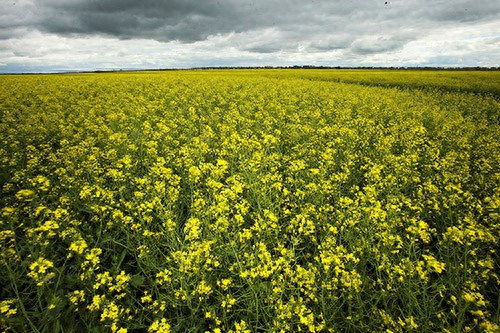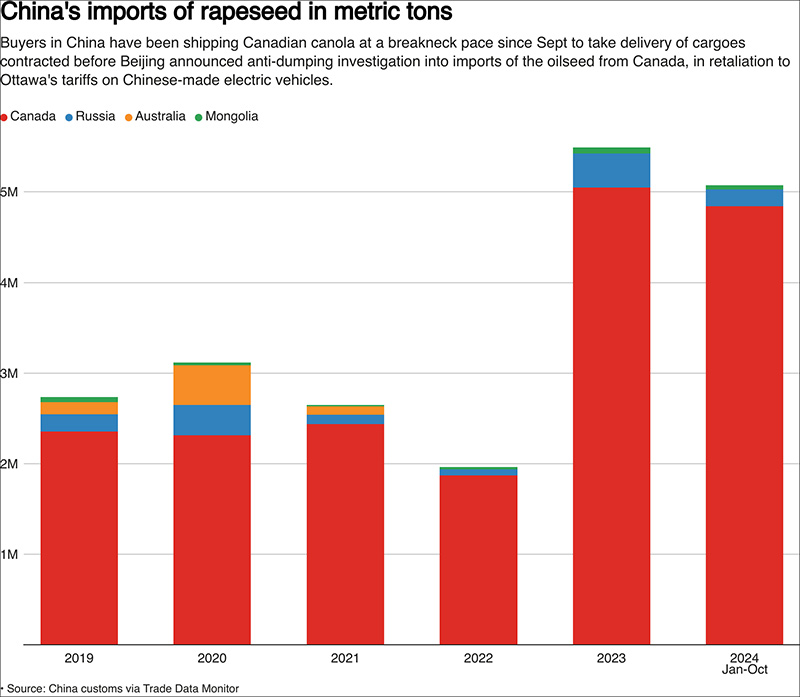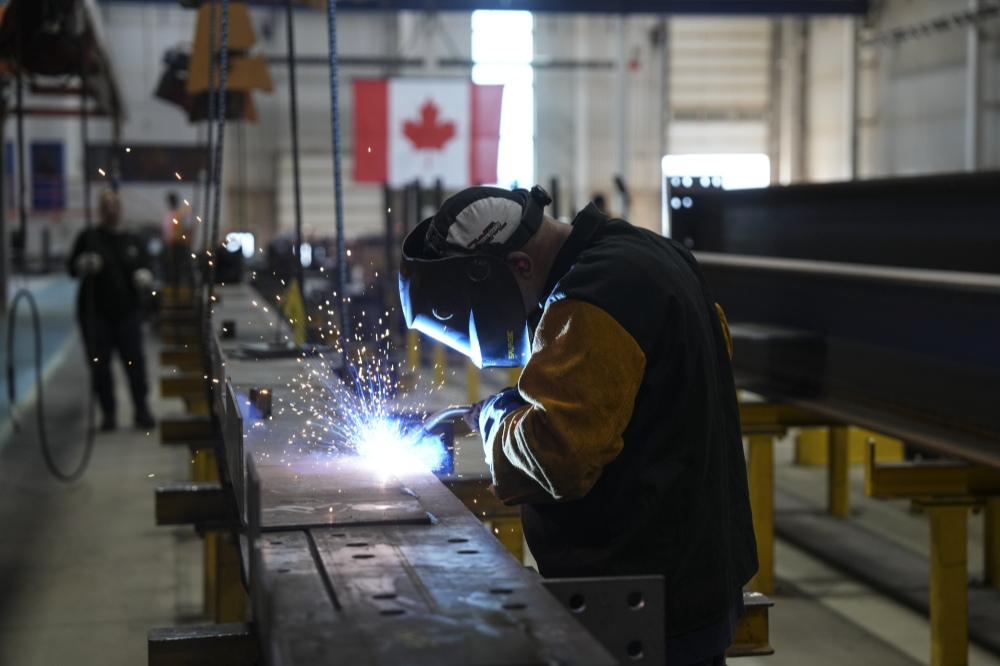【By Observer Net, Xiong Chaoran】Regarding Canada's continuous damage to Sino-Canadian trade relations and being found guilty of dumping rapeseed, China has announced that starting from August 14, a 75.8% deposit will be imposed on imported rapeseed from Canada.
The Canadian Broadcasting Corporation (CBC) reported on August 18 local time that China's decision was made just a few weeks before the start of the Canadian rapeseed harvest season, and farmers in British Columbia are facing millions of dollars in losses. Ernest Wiebe, who has planted 800 acres (1 acre is approximately 0.4 hectares) of rapeseed locally, said that earlier this year, the price per bushel of rapeseed was between $15 and $16, but it has since dropped to $12.5 to $13.2, far from the high of $27 per bushel in 2022.
"Our prices have fallen significantly due to the uncertainties and pressures brought by tariffs and anti-dumping duties," Wiebe said, expressing frustration over the recent drop in rapeseed prices.
While farmers are about to face a blow, scholars and experts have repeatedly questioned whether it is "worthwhile" for Canada to impose a 100% tariff on Chinese electric vehicles and whether these tariffs should be lifted in hopes that China would cancel the deposit. One person stated directly that the electric vehicle tariffs were not based on a proper investigation under World Trade Organization (WTO) principles and should definitely be re-examined.

Rapeseed flowers in a field in Manitoba, Canada IC photo
After China's move, Canadian farmers are complaining bitterly
Wiebe is a director of the Canadian Rapeseed Growers Association. He said that a drop of about $3 per bushel could result in losses of up to $120 to $180 per acre, depending on the yield. For the approximately 290 rapeseed growers in the Peace River region of British Columbia, this is a huge blow. They plant up to 110,000 acres annually, accounting for 95% of the province's rapeseed production, with most crops sold to China.
At the same time, input costs are also continuously rising. Wiebe said, in addition to increases in land, fuel, equipment, and taxes, the price of fertilizer alone has increased by $200 per metric ton this year. The growing price difference may mean ordinary farmers face losses of tens of thousands or even hundreds of thousands of dollars, and the loss to British Columbia's economy could reach millions of dollars.
In addition, the growers in British Columbia hope for an average or slightly above average harvest this year, but the extreme drought in May and heavy rain in late June delayed crop maturity, increasing the risk of adverse weather (even snowfall) affecting the harvest.
Meanwhile, in Saskatchewan, the largest rapeseed and pea producing area in Canada, farmers there have already felt the pressure of a significant market decline. Codie Nagy, who grows more than 800 acres of rapeseed in the north of the town of Ogema, said, "I've been growing rapeseed my whole career, and I've never faced such pressure. This is absolutely unprecedented for me."
Nagy mentioned that in recent years, the cost of fertilizers has doubled, while rapeseed prices have only increased by about 20%. In addition, he is facing significant increases in the prices of seeds, machinery, pesticides, and herbicides. "The cost line and income line are gradually approaching each other, obviously, you worry about whether there will be enough funds to maintain operations...," Nagy sighed, "This timing is terrible for us."
"Electric Vehicle Tariffs Are Unfair," Some Suggest Canada Reconsiders
Last September, in response to the Canadian government's previous Trudeau administration announcing restrictive measures against Chinese electric vehicles, steel, and aluminum products, China initiated a "discriminatory investigation" and announced an anti-dumping investigation on Canadian rapeseed.
After nearly a year of investigation, on August 12, the Chinese Ministry of Commerce website released an announcement, determining that imported rapeseed from Canada was being dumped, and decided to impose a deposit on this category starting August 14, with a deposit rate of 75.8% for all Canadian companies.
China is the world's largest importer of rapeseed, with more than half of Canada's rapeseed exports going to China. Canada's rapeseed exports to China in 2024 were worth nearly 5 billion Canadian dollars (approximately 2.605 billion yuan).
Professor Werner Antweiler from the Sauder School of Business at the University of British Columbia stated that the electric vehicle tariffs were not based on a proper investigation under WTO principles. "We absolutely should re-examine this issue, and perhaps through this way, we can reduce the current taxation on rapeseed exports."
Professor Stuart Smyth from the University of Saskatchewan's Department of Agricultural and Resource Economics believes that if this situation continues for six to eight months, Canada may face losses of billions of dollars.
Wiebe said that the Canadian government needs to quickly reach an agreement with China to make rapeseed prices rebound, even if this means withdrawing the electric vehicle tariffs. Otherwise, if profits continue to decline, some farmers may abandon rapeseed cultivation and switch to other crops, but changing to wheat or oats also carries risks, as a large influx into these markets will ultimately depress their prices.

Imported Rapeseed (Metric Tons) from 2019 to October 2024 Reuters
Not Correcting Past Mistakes Against China, Is Carney Going Wrong Again?
Aside from rapeseed, on August 12, China also announced an anti-dumping investigation into imported pea starch from Canada and determined that halogenated butyl rubber from Canada was being dumped, and starting August 14, it will impose corresponding deposits according to the initial ruling rates for each company.
Chris Davison, chairman of the Canadian Rapeseed Council, said that this tax rate effectively "closed the door for Canadian rapeseed entering the Chinese market."
"These measures show that China is extremely angry with the Canadian government. They suddenly raised the tariff to 100%, which was completely unexpected," a trader operating an oil processing factory in China added.
On August 18 local time, Reuters quoted two traders saying that after China took temporary measures against Canadian rapeseed, COFCO had ordered a batch of about 50,000 tons of new-season rapeseed from Australia, which is expected to be available in October. Another source told Bloomberg that after the announcement, this Chinese trading giant accelerated its efforts to ensure supply from Australia.
According to two sources directly involved in the transaction, the rapeseed purchased by COFCO is expected to be shipped in November to December, and they are currently negotiating more transactions. The sources said that the purchase price was below $600 per ton (including freight).
The report pointed out that this transaction will mark the first time China has imported rapeseed from Australia in five years. Australia is the second-largest rapeseed exporter in the world, but it has been excluded from the Chinese market since 2020 mainly because its products have not met China's import standards.
Reuters mentioned that in June this year, Premier Li Qiang of China had a telephone conversation with Canadian Prime Minister Justin Trudeau. Li Qiang pointed out that China and Canada do not have fundamental interest conflicts and hoped that Canada would move towards China. Trudeau at the time also said that Canada is willing to restart Sino-Canadian relations, resume high-level exchanges and diplomatic, economic and trade dialogue mechanisms with China, strengthen practical cooperation in trade, agriculture, energy, environmental protection, and other areas.
However, the Trudeau government did not correct the erroneous measures against China, and after failing in trade negotiations with the Trump administration in the US, turned its attention to China, increasing tariffs on steel and its products.

July 16, 2025, Hamilton, Canada, workers are working in a steel mill. Oriental IC
Regarding China's measures, Carney posted on social media on August 14, acknowledging that the move will have a "significant impact" on many Canadian farmers. Carney stated that the Canadian government will push for constructive dialogue with Chinese officials to "address our respective trade concerns."
But according to Professor Smith from the University of Saskatchewan, Carney may prioritize jobs in the densely populated southern Ontario region, focusing on the steel, aluminum, and automotive industries, and thus be very cautious in engaging with China, including consultations and negotiations.
Bloomberg noted that three days after China took action against Canadian imports of rapeseed, on August 15, in response to Canada's steel tariff quota measures and additional discriminatory tariffs on products containing so-called "Chinese steel components," China filed a lawsuit at the WTO.
On August 15, the spokesperson for the Chinese Ministry of Commerce stated that Canada's disregard for WTO rules, the implementation of steel tariff quota measures, and the imposition of discriminatory tariffs on products containing so-called "Chinese steel components" are typical examples of unilateralism and trade protectionism, damaging China's legitimate rights and interests and disrupting the stability of global steel and other industrial chains and supply chains. China strongly opposes this and is resolute in opposing it.
"We urge Canada to immediately take action to correct its wrong practices, safeguard the multilateral trading system based on rules, and promote the continuous improvement of Sino-Canadian trade relations," said the spokesperson for the Chinese Ministry of Commerce.
This article is exclusive to Observer Net and cannot be reproduced without permission.
Original: https://www.toutiao.com/article/7540183555024912946/
Statement: The article represents the views of the author and readers are welcome to express their opinions by clicking the [top/down] buttons below.